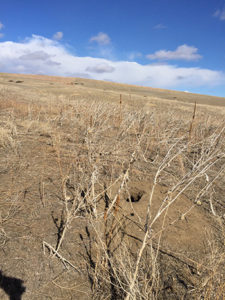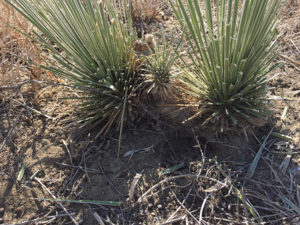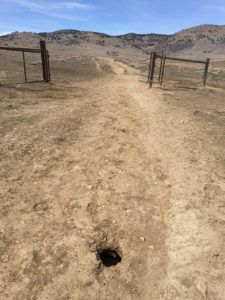All Boulder County Horse Owners, Agricultural Property Owners and Lease Holders, and Open Space and Mountain Parks Users should be concerned about the detrimental effects of having too many prairie dogs on our Open Space properties. We encourage you to get active now. That means getting out to attending City Council and Open Space and Mountain Parks meetings as much as you can in the next few weeks. Decisions are now being made about the forthcoming Grassland and OSMP Agricultural Land Management Plans that will affect us all. For starters, we will be seeing a 30% decrease in funding for OSMP management over the next few years.
 So what is the “prairie dog problem?”
So what is the “prairie dog problem?”
Over the last few years, many of our agricultural lands and open space properties have been dramatically and negatively affected by an over population of prairie dogs, which is the result of a lack of predators, fragmented land parcels, and current management policies. Essentially, the prairie dog problem is one of density and overgrazing, which has led to destruction of our agricultural land, diminished economic value, and a decline in ecological diversity.
Although Boulder County authorities once believed that, “the presence of prairie dog colonies…leads to …overall species richness in the grassland prairie,”1 today’s increased density and size of the colonies has resulted in the opposite effect. Ranchers who have been leasing and managing open space lands are pulling out of their leases. Why? Because production yields of hay and grazing acres have been so depleted by the over grazing of prairie dogs. This is leading to our open space agricultural lands becoming unprofitable and unleasable. Hence, they are no longer being tended which results in continued degradation and further expansion of prairie dog colonies. (For two examples: see OSMP land along Jay Road and 49th, once productive hay fields, and Boulder Valley Ranch agricultural parcels.) A vicious cycle has resulted. The drop in hay production yields has created a lack of available local and viable grazing lands for cattle, horses and other livestock. If yields decrease, hay prices increase, which results in low profitability for land managers and abandonment of leased open space.

Naturalists also see cause for concern. What is also occurring, at a terrifying rate, is the degradation of the grassland habitat with associated loss of wildlife. Prairie dogs are grass eaters, consuming not only the visible blades, but also the roots, which kills the grass completely. They do the same to yucca plants, thereby affecting nesting meadowlarks. This is just the beginning. Once established on fragmented lands with an imbalance of predators and natural cycles of plague die off, prairie dogs generally deplete grassland vegetation by decreasing the amount of grass cover, increasing the amount of bare soil, loss of topsoil and poor air quality from more frequent dust storms. This is also facilitating dominance by non-native flowering herbs—conditions that are attractive for the establishment of weed species. For a more in-depth perspective on this situation, we recommend Impacts of Urban Prairie Dogs on Soils in Boulder, Colorado by Matthew Oliver, University of Colorado, Boulder, an excellent read.
Currently, OSMP is applying deltamethrin, ‘Delta Dust’, a pyrethroid to prevent plague. This is a synthetic chemical made to mimic the components and effects of the natural insecticide pyrethrin. It is a broad-spectrum insecticide used both indoors and outdoors and kills target insects via ingestion or direct contact by interfering with normal production and function of signals in the insect’s nervous system. Visit the January 15, 2019 Boulder City Council Minutes for further information. Although it is only mildly toxic to most birds, Delta Dust is labeled as extremely toxic to fish and aquatic invertebrates. It is also highly toxic to beneficial insects like honeybees and beneficial predators that kill pest insects, such as the predatory mite Typhodromum pyri and the parasitic wasp Encarsia formosa. This application is changing the biodiversity of our open space lands and preventing the die off of prairie dogs.
What will happen to our agricultural legacy and lands?
Open Space and Mountain Parks (OSMP) knows there is a problem. City Council also is hearing there is a problem. So what can you do? Go see for yourself what the prairie dogs are doing to Boulder County’s Open Space and Mountain Park’s. If you are a newcomer to the area you may not know that we once had rich and diverse grasslands where now we have thousands of prairie dog holes and barren landscapes. All you have to do is go for a walk or a ride on some of our OSMP properties, count the prairie dog holes, and take note of the deplorable condition of the pastures and grasslands. As land use leases go un-renewed or abandoned, our agricultural legacy itself is being abandoned. If the land cannot meet reasonable production yields or sustain grazing, ranchers and farmers will sell off livestock and abandon leases, and soon what we once loved about the natural and agricultural legacy of Boulder will be all but lost to the next generation!
Consider acting right now!
What can you do? Be a visible and positive partner as a citizen who supports and is a steward of open space and agriculture on our public lands.
- Go to City Council or Open Space meetings.
Choose a talking point that is important to you, sign up to speak for two minutes, pool minutes with friends, and convey your support for improving prairie dog management in Boulder County! - Fill out this timely OSMP Questionnaire by April 7, 2019
How should Open Space and Mountain Parks (OSMP) prioritize your tax dollars over the next 10 years? What strategies should OSMP focus on first? Share your management preferences by midnight, Sunday, April 7, through this online questionnaire: http://bit.ly/OSMP-Input5
Some possible talking points:
- unsustainable density of the current prairie dog population
- danger to livestock(including horses!) from stepping in prairie dog holes
- damage to agricultural lands, habitat, grasslands from overgrazing
- dust, erosion—it’s ugly
- impact on trails/safety
- Costs associated with the loss of water from irrigation going down the holes rather than into fields, what does that mean for downstream users?
- Cost and availability of hay
- High lease losses as ranchers abandon properties, (they have been stewards of these properties for many years-what is going to happen to the land if abandoned?)
- As a taxpayer, I am concerned, I do not want to pay for PD’s on agricultural open space that should be under lease and producing income.
Meeting Calendar: City Council and OSMP Board of Trustees
City Council Meetings (Generally held the first and third Tuesdays of every month at 1777 Broadway)
Upcoming dates:
April 2
April 16
May 7 (this will be the final hearing on prairie dogs)
It is important to attend and add your presence to the room as often as you can. If speaking, you have two minutes.The first hour is open comment for items not on the agenda—and this is likely the time you will want to speak. Sign-up as soon as possible, online is best! You can leave after open comment is done.
Note: Only 20 speakers may address council on any issue that is not a public hearing.
City Council emails:
https://bouldercolorado.gov/city-council/mayor-and-city-council
Open Space Board of Trustees
Meets the second Wednesday of every month at Council Chambers, 1777 Broadway
March 27, 2019
This is an important meeting, please try to attend.
6 to 8 PM (rescheduled from March 13)
If you plan to speak you have 3 minutes, you can sign up in-person starting at 5 PM. Forms should be turned in to the secretary before public hearing begins. Public comment starts around 6:15 PM
This one is important, try to get people to come to meeting, sit in visible locations, wear classic ranch-like wear if possible. Try and show up in a group.
April 10, 2019
This is a very important meeting, please try to attend.
Write to our OSMP Board of Trustees
OSBT emails:
Open Space Board of Trustees

Boulder Valley Ranch and GunBarrel Hill
One of the most affected areas in the City properties is the Boulder Valley Ranch Open Space. Boulder Valley Ranch Open Space was once lush with native prairie grasses, and rich in biodiversity, BVR’s barns, grazing animals, songbirds, hawks and butterflies, made it a place of beauty with a rich agricultural history. All that has changed. The ranching family that has been leasing these agricultural parcels for more than 20 years has seen prairie dog colonies expand at an alarming rate. They have advanced into all the agricultural pastures, forcing the family to sell off cattle. Once productive fields are now unsafe to run equipment in, let alone allow livestock to safely graze. BVR’s horse grazing pastures, which were once abundant with waist-high grasses, are today full of holes, rampant with weeds, and precious irrigation water is not making it into the fields nor to downstream users just pouring down into holes. Gone is the habitat that once hosted migrating songbirds and butterflies, and ecological diversity.
Our trails are also being affected. Just last week one of our BCHA members, Linda Parks, was riding her horse on the Cobalt trail and the ground collapsed under her horse’s rear foot (see right), sending it into a prairie dog hole—luckily neither was injured.
The problem is growing. Today on another beautiful open space property, Gunbarrel Hill, three prairie dog colonies are expanding rapidly. Over the last 20 years, the effort and considerable tax dollars spent to develop and nurture native grasses in this area has led to the return of rare nesting birds, such as the grasshopper sparrow, and a rare species of butterfly that will only lay its eggs on two types of grass. OSMP would like us to help them save these nesting birds by considering trail relocations and closures. But it is hard to support them in this venture until they come up with a definitive management plan for the control and spread of prairie colonies on our fragmented open space lands.
What can be done?
There are many contrasting opinions as to what should be done. In January 2018, Boulder County held a session on prairie dog management (please see http://www.dailycamera.com/boulder-county-news/ci_31589918/boulder-county-prairie-dog-management). During the session Blake Cooper, agricultural resources manager for Boulder County Parks and Open Space, elaborated.”It’s becoming an increasing problem on what are considered some of our no- prairie-dog agricultural land, and we’re kind of falling behind in our ability to manage it. We’re being inundated,” he said.
In the next few weeks, the City Council-appointed Prairie Dog Working Group will release their findings—stay tuned!
There are a number of possible solutions to the prairie dog problem, each of which we realize contains some unpopular aspects, but none of which, in our opinion, is worse than allowing the current situation to continue. You can read about the options, including relocation, extermination, and other solutions in the Colorado State University document: Managing Prairie Dogs https://extension.colostate.edu/topic-areas/natural-resources/managing-prairie-dogs-6-506/
We all are in awe of where we live. Boulder is a very special place. We also have a deep respect for our environment and the agricultural history of the area. We respect life, love animals, and want future generations to experience this place as we have been fortunate to do. But environmental changes are affecting us all, and it is our responsibility, as stewards of the land, to remain flexible in how we care for it.
1Boulder County Parks and Open Space Prairie Dog Habitat Element of the Grassland and Shrubland Management Policy (page 21, section 5.2).
